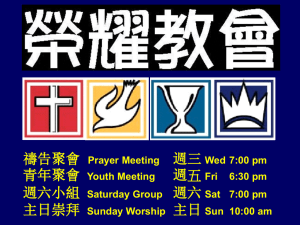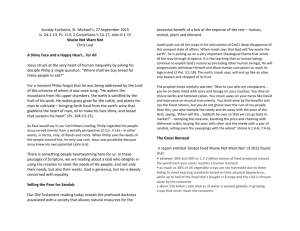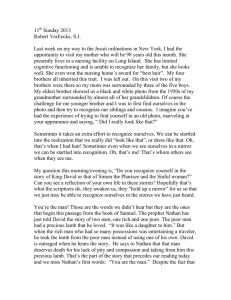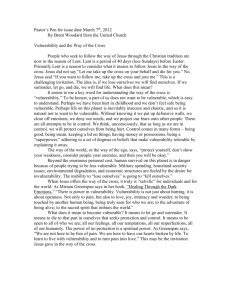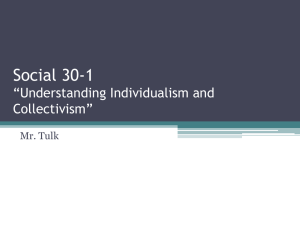Theme 10: Christ and Culture
advertisement
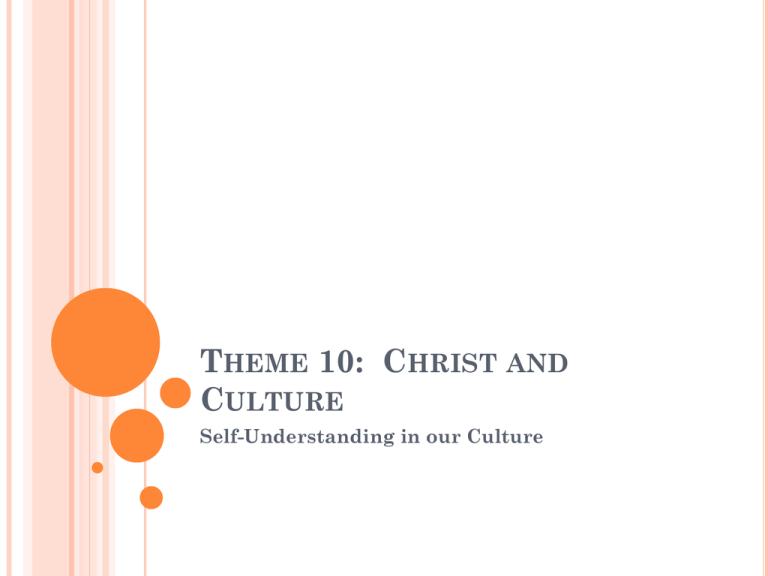
THEME 10: CHRIST AND CULTURE Self-Understanding in our Culture KEY TERMS Self-understanding-society tends to see the self as being isolated from others, but self understanding cannot happen without the other. At the heart of who I am lies the things that I am committed to, things that are of crucial importance to me. Self-esteem- Awareness of one’s own worth Individualism- to defined later INTRO: Our culture’s vision of the individual influences how you see yourself, which affects how you live as a consequence God has a vision of who we are also Jesus’ ministry told us about God and who we are in the sight of God The good news of Jesus helps us see ourselves as we really are – beloved by God MY IDENTITY It is more than just my name It is what is important to me – my values, and what I find good It is connected to the commitments I make It is connected to where I stand The way we think is shaped by Western culture- and has been evolving for many centuries RENE DESCARTES In 1642 this French philosopher searched for a new way to knowing – one based solely on his own authority, rather than being shaped by culture He undertook a doubting experiment: questioning everything that people of his time held certain – God, the scriptures, Jesus and the church, the world around him, the principle of mathematics. The result was the only thing he knew for certain was his doubt- that he didn’t know anything for certain His most famous phrase was “I think, therefore I am”. The only thing he could find certainty in was his own thinking This attitude of skepticism has stayed with the world today and has influenced Western culture ever since INDIVIDUALISM We believe ourselves to be individuals. Individualism: The isolation of self in Western Culture. It puts more emphasis on the individual than the community. As a result, our culture often has conflicts between the rights and values of the individual and the common good of society We all look at ourselves differently, but we share a lot of common characteristics that set us apart from people who lived, many years ago, or from those who live in non-western cultures. There are seven tendencies that people in western culture have when it comes to identifying who we are. Our culture has shaped us in these ways without us necessarily being aware of it. SEVEN TENDENCIES OF INDIVIDUALISM 1) I am free I am not bound to anyone or anything I am responsible to myself The only authority I accept is one that protects my freedom from the attempts of others to take it away 2) I have rights These are protected by declarations of human rights, including Canada’s Charter of Rights 3) I am equal I have the same claim to freedom, dignity and rights as everyone else I am interested in myself and use my power to further my own interests Nations need governments to protect people’s rights and equality and citizens must have a voice in government or decisions that affect them 4) Only reason binds me Knowledge comes through observation and experience I need evidence that things are true “empirical” knowledge has been powerful influence in the development of science and technology 5) I am isolated from everything In relationship to the world and to others, I am an observer I see everything from my own perspective 6) I am master of the earth The earth is an object of my study and observation I can exploit it as I see fit for my own benefit and happiness I am also the master over my own body 7) I am godless The world is centered on me and God has no place, except for at the limits of my life (times of sickness, death, disaster, etc.)
